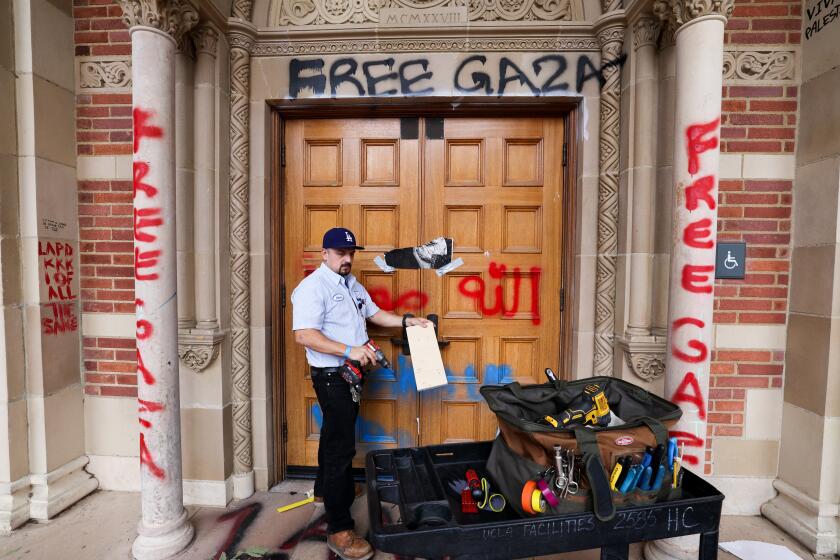Officials Hesitant on Suing for Soka University Land : Parklands: Condemnation proceedings could be lengthy and costly. And the school refuses to budge.
The future of a Calabasas meadow, coveted by opposing factions for either a public park or a bustling college campus, is uncertain as both sides prepare to fight for the right to use the valuable land in the heart of the Santa Monica Mountains.
Administrators of Tokyo-based Soka University are determined to develop their 580 acres into a 4,400-student college. State and federal park officials want to acquire the property for the headquarters of the Santa Monica Mountains National Recreation Area.
But after the breakdown of negotiations between the two sides, park officials are deciding whether to play a problematic trump card: land condemnation. A year after first suggesting such legal action, government officials are reluctant to pursue what will likely be a protracted, costly legal fight.
Moreover, park officials continue to hope that the difficulty of satisfying strict Los Angeles County and California Coastal Commission requirements to develop the site will break the school’s resolve.
“Soka hasn’t even begun to confront the issues yet,” said Joseph T. Edmiston, executive director of the Santa Monica Mountains Conservancy, a state agency charged with amassing Santa Monica Mountains land for the state and federal park systems.
In the meantime, park advocates are lobbying in Washington, D.C., to secure federal funding to make an offer to buy the land, which is also the first step in condemnation proceedings.
Pending state legislation could hinder the conservancy’s efforts to buy or condemn the land by requiring public agencies to pay replacement costs for property taken from nonprofit organizations. Edmiston estimated that the bill would add $10 million to the price of the 248 acres that the park agencies want to buy.
“If it passes, it’s a big blow,” Edmiston said.
Park officials said they plan to offer up to $30 million to buy 248 acres southeast of Las Virgenes Road and Mulholland Highway, less than half of the Las Virgenes Valley property owned by Soka. The school bought the 248-acre parcel in 1986 for $17.7 million and reports that it paid another $28.6 million last year for 332 acres to the north and east.
An offer must be made and rejected before condemnation can be considered, but no offer can even be made until the money is available.
The National Park Service and the Santa Monica Mountains Conservancy only have about $16 million set aside for the Soka property, Edmiston said. Another $14 million has been requested by Rep. Anthony C. Beilenson (D-Los Angeles) from the 1992 federal budget. If the $14 million is awarded, it would not be available until next October.
School representatives have staunchly maintained that their land is not for sale.
“I think it’s safe to say Soka University is here and it’s here to stay,” spokeswoman Bernetta Reade said. The school filed its initial application for environmental review with the Los Angeles County Regional Planning Department on May 2, after rejecting three possible alternative sites identified by the park agencies.
Some observers, including several former members of the religious sect associated with the school, said the park officials may have greatly underestimated the tenacity of their opponent.
“These people will hold out . . . for as long as it takes to get what they want. They are the pit bulls of religion,” said a former member of the U.S. wing of the Buddhist offshoot known as Soka Gakkai, who spoke only on condition of anonymity.
The other option, going to court to condemn the land for public use, is expensive, time-consuming and may be unsuccessful, said several state condemnation specialists.
Government agencies may seize land through condemnation if it is deemed essential for the public good. Under condemnation, a jury determines the land’s value after listening to experts representing the government and the landowner.
State parks officials expressed concern that the state Public Works Board, which must give initial approval for condemnation proceedings, would reject a conservancy request. Although the Soka site is considered essential by the National Park Service, it is not on the state’s priority list, said Kenneth L. Mitchell, chief of acquisition for the state Department of Parks and Recreation.
Gov. Pete Wilson is an avowed supporter of the Santa Monica Mountains, however, which could influence the board’s decision, Edmiston said.
The conservancy has never attempted condemnation. The National Park Service sought to condemn ridge-top property near Malibu in 1987, but failed to receive government approval. The state Department of Parks and Recreation condemned several parcels of land for the Santa Monica Mountains Backbone Trail in the early 1980s, but rarely uses the tool these days.
“We always lose when we go to condemnation, if you look at dollars,” said Warren Westrup, state parks acquisition supervisor.
Westrup recalled what he described as the “horror stories” of public land condemnation. In one such case in Santa Cruz, a jury awarded the property owner nearly three times the appraised value for a strip of beach, forcing the state to abandon the purchase and pay the owner’s attorney fees.
Soka’s determination and its seemingly abundant financial resources would likely result in a long and expensive condemnation process, Westrup said. The cost of the proceedings is one of the factors considered by the Public Works Board and could weigh against park officials.
Beilenson mentioned the possibility of condemning the Soka land earlier this month when he asked a House appropriations subcommittee for the $14 million. But local park representatives have recently backed away from openly discussing the merits of condemnation on the advice of their attorneys.
In previous state suits, landowners have argued in court that government threats of condemnation had devalued their land.
Edmiston said he now believes condemnation may not be the best way to acquire the land, citing the conservancy’s bid to buy the Paramount Ranch in Agoura.
Two years ago, a condemnation attorney hired by the conservancy estimated that a jury would value the 320-acre Paramount property at more than $30 million. When the landowners ran into financial troubles later, the conservancy stepped in and negotiated a tentative agreement to buy the land for $17.8 million as part of a bank foreclosure settlement.
“Why get it through a protracted, difficult process when by waiting you may get it through a much easier and quicker process?” asked Edmiston.
However, waiting is viewed as dangerous by those who believe condemnation should be attempted as readily for parks as it is for freeways and jails. Development or land grading can begin in the interim, said private land negotiator Hulet Hornbeck, former acquisition manager for the East Bay Regional Park District.
“If development starts, you have a significant increase in the value of the property . . . the landowner or developer would expect to be reimbursed for damages,” Hornbeck said. “Even if they just begin grading, you have a cost in restoring the area to a natural topography.”
Park officials have questioned Soka’s involvement in the creation of the bill concerning property values being carried by state Sen. Nicholas C. Petris (D-Oakland).
“The working is exactly apropos to Soka,” Edmiston said. “I just find it hard to believe they were not behind it.”
Petris is sponsoring the bill because of a bitter condemnation case involving a Seventh-day Adventist school that the Lynwood Unified School District is trying to condemn.
The bill would allow owners of some nonprofit organizations, including schools and churches, to increase the value of their land to include the cost of rebuilding in the same area. Currently, government appraisals reflect only the value of the land and the depreciated value of the buildings.
Soka spokeswoman Reade said the university became aware of the pending legislation through an attorney it hired last year to advise it on how to avoid condemnation. Reade said the attorney, Hodge Dolle, also represents the Lynwood church school and helped fashion the legislation.
“The university is watching what is happening with the bill, but is not a sponsor of it and will not participate in any kind of lobbying for it,” Reade said.
Petris aide Lisa Ramer said the senator knew nothing of Soka University until a reporter inquired about the connection.
Despite the conservancy’s request that the Santa Monica Mountains be exempted from the bill, Petris does not plan to amend it because “the principle is too important,” Ramer said. The bill passed the state Senate Appropriations Committee on Monday and is headed for a vote of the full state Senate this week.
More to Read
Start your day right
Sign up for Essential California for news, features and recommendations from the L.A. Times and beyond in your inbox six days a week.
You may occasionally receive promotional content from the Los Angeles Times.






